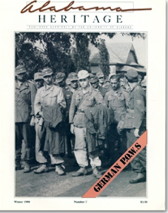The Alabama Heritage magazine has an online reprint of "Inside the Wire: Aliceville and the Afrika Korps" by Randy Wall.
A classic opening:
The slow-turning fans above the soda fountain at Jones’ Drugstore in Aliceville brought scant relief from the sultry heat. It was August of 1942 and the Corps had arrived—the U.S. Army Corps of Engineers. Everyone had seen them, with their tripods and transits, squinting down imaginary lines over on Doc Parker’s land, near the dairy now operated by the doctor’s son, Tom. The crowd at the drugstore argued endlessly about the significance of the Corps’ presence.
The camps offered real benefits to local communities:
the impact of the construction payroll on the community was immense. Up to $75,000 per week was pumped into the Aliceville economy, area rooming houses were filled to capacity, and in the weeks before Christmas the town experienced nearly total employment.
POWs arrive:
For most of the new arrivals, food had been limited throughout their duty in North Africa, and conditions had grown worse after their capture. There had never been enough food at the mass internment camps, and the situation had improved only slightly on the crowded ocean voyage to the United States. Most of the men were severely malnourished, a fact reported to Colonel Prince, who quickly made the decision to open the mess halls that night.
That was no simple task, yet by 2 A.M. the initial group of prisoners sat down to their first substantial meal in months. If the last nine hours had bewildered the German POWs, this they understood—food. Food in abundance—meat, eggs, vegetables, coffee—even a strange, sticky concoction that appeared to be made from mashed peanuts. After months in the desert living on military rations, the sights and smells in the mess halls that morning were almost beyond comprehension for the new arrivals.
There's lots more in the article, including several interesting sidebars.


